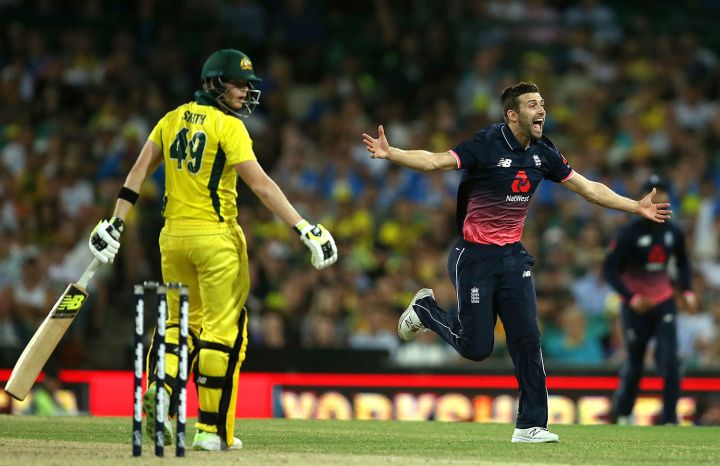Australia must raise ODI tempo - Maxwell
As Australia arrived in Adelaide for the ODI on Friday, fast bowler Josh Hazlewood said that more attention needed to be paid to the way bowlers transitioned between formats

It is often said by retired players that perspective can be easier to find from outside a cricket team than within it. From his out-of-favour vantage point as surplus to Australia's ODI team, Glenn Maxwell has a simple answer to questions about what Steven Smith's team are doing wrong with the bat - they are batting at a tempo the world's more confident teams have long since deemed too slow.
While Maxwell feels he has made the very evolution as a batsman that Smith, the coach Darren Lehmann and the national selectors seem to be asking for, he believes that the team he was once a part of has fallen behind England and others in terms of the cruising speed they employ with the bat.
Where Australia had been happy to score around six an over for the first 10 overs and then throttle back to four or five until the closing overs, Maxwell said that England had shown it was better to be more aggressive and then "chill" at a run a ball. "They're obviously playing the new brand of one-day cricket," Maxwell said, "which is go as hard as you can for 15 or 16 overs, chill out at 10 but still go at six an over.
"I think the Australian one-day team for a while our chill-out time has been four and a half to five an over of just making sure we conserve wickets. I think these days you just can't afford to do that. You've got to be a little tougher and got to be a little more boundary-conscious."
Maxwell's words provide further impetus to the search for a refreshed approach from the Australian ODI set-up, after the selection chairman Trevor Hohns conceded that a full review of the team's personnel and tactical approach was required in order to be competitive at next year's World Cup. In assessing his own development, Maxwell said he was disappointed he had not been given the chance to show his evolution after being shunted up and down the batting order prior to being dropped in India last year.
"I feel like I've changed a little bit over the last period of time where I'm able to work my way through situations instead of just going ahead and blasting it," he said. "Looking back at the Indian ODIs, I probably didn't have the chance to show that. The first game turned into a T20 and I came out and we needed 13 an over, and I think the game before I got dropped I was sent in with six overs to go. So there wasn't exactly time to rebuild and work through an innings."
As the Australian team, sans Maxwell, arrived in Adelaide ahead of the dead rubber Australia Day ODI on Friday, fast bowler Josh Hazlewood said that more attention needed to be paid to the way bowlers transitioned between formats. While much work has been done around their physical preparation and workload management, Hazlewood said the different skill sets required in the shorter forms needed to be better addressed in the future.
"We haven't quite transitioned from Test cricket to one-day cricket as well as we could have," Hazlewood said. "England have two sets of bowlers in some regard, with only [Chris] Woakes and [Moeen] Ali backing up so they're really one-day specialists, I guess you could say and they've showed us how to play. I think you still want your best bowlers playing...but you do need to work on skills from time to time. Maybe it's a session here or there around Test cricket, you work on those skills with the white ball.
"We can probably learn and do things a bit differently. I guess you have to outline some training sessions for the white-ball stuff and work on your variations even while you're playing on a Test tour. My role in one-day cricket is a little bit similar to Test cricket, I bowl at the start a lot and a little bit through the middle. But for some guys like [Mitchell] Starc and [Pat] Cummins, their one-day game is probably closer to a Twenty20 game where they bowl a lot of overs at the end when the [opposing] batters are going."
By contrast, England have been refreshed by the changeover, something Woakes said was as much a matter of mindset as of tactics. "It's just a different game...different format, different ball," he said. "It's more of a mindset thing because you're constantly trying to hit the ball in one-day cricket whereas, in Test cricket, you're more wary. People who don't know the game that well would probably think it's a red, it's a white ball - what changes? But it's amazing how much it does change.
"Winning is a habit so we'll be trying to do that in the last two games to secure a 5-0 whitewash. It is a huge motivation. We're obviously delighted to win the series...but we won't be letting up. We'll still be trying to go out there on a big day for them, Australia Day, and turn them over. You don't come out to Australia and win too often so, once you've got your foot on the throat, you want to keep it down. If the roles were reversed, then Australia would be doing exactly the same thing to us."
Daniel Brettig is an assistant editor at ESPNcricinfo. @danbrettig
Read in App
Elevate your reading experience on ESPNcricinfo App.